But what I have done in the last round of the Frankfurt Championship is without precendence in my chess career. Rudolf Spielmann or Mikhail Tal probably wouldn't have thought twice about my 8th move but for me it might have sufficed to just play on calmly and wait in open tournament specialist style until the ripe fruit falls into my lap at some point later.
But how could I have slept in peace if I hadn't played the way I did? First and foremost I'm not a professional but play chess as a pastime and who would not want to have a game such as the following on his or her record. So here is my own personal brilliancy:
Ramat Faqiry (1983) - Oliver Uwira (2248)
1. d4 Nf6 2. c4 c5 3. dxc5 White chickens out. He had a good reason to do so because one of my students beat him in a Benkö gambit at the Rhein-Main open tournament two weeks ago. 3...Na6 4. e3 Nxc5 5. Nf3 g6 6. b4?! White's 4th and 5th moves were a bit tame. It is therefore not advisable to loosen up his position at the cost of development. In addition, Black is prepared to bring his bishop to the long diagonal, which White has just opened. After the following move, the square f2 will also be an issue. 6...Nce4! 7. Bb2 Bg7 8.Nbd2? White would have been better off after 8.Nc3 Ng4 9.Nxe4 Bxb2 10.Rb1 Bg7, which costs him the bishop pair but otherwise keeps his position intact. Now the hammer falls:
8...Nxf2!!
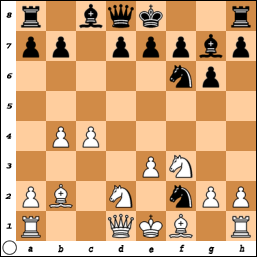
At the small cost of a knight, White's king is sucked out into the great wide open. I had convinced myself that the worst that could happen for Black is having to play with rook and pawn against two minor pieces in case no mate presents itself. My feeling told me, though, that there must be a win along the road.
9. Kxf2 Ng4+ 10. Kg3 Qc7+ 11. Kxg4 d5+ 12. Kh4 Bxb2 13. g4
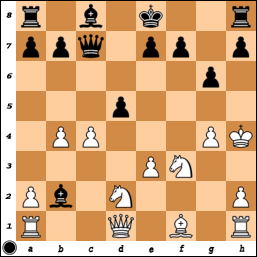
White's last move was forced as it is the only defense against the direct mate Bf6. 13. Nd4 does not work because of 13...Bxd4 14.exd4 Qf4+ with mate. I had seen that before, but now my plan was to open the h-file and hunt my material back. It is a pity that I haven't found 13...d4!! or 13...h5 14.g5 d4!! which would have set up the Qf4 mate idea once again, this time without sufficient defense for White.
After the text move, the game enters a new phase. Black will gain material compensation for his piece and the white king will remain vulnerable on g2.
13...g5+?! 14. Kh3 h5 15. Kg2 hxg4 16. Nd4 Now here is the crossroads. I had seen that White wouldn't have time to save his rook for quite a while, but now he is ready to do so. I was a bit worried about a white queen at a1 and also about a possible Nd4-b5 so I decided to eliminate that knight while grabbing another pawn, levelling the score, materially speaking. Rybka offers 16...Bxa1 17.Qxa1 Qe5 and claims a black advantage. However, the little fish is also content with my game continuation, which is actually its first choice. 16...Qe5! 17. Rb1 Bxd4 18. exd4 Qxd4 19. Qc2!
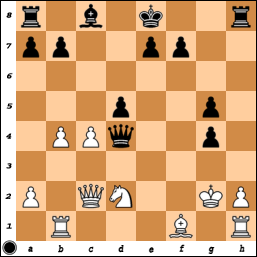
White wisely prevented the black bishop from showing up on f5, which would have led to rapid black mobilisation after castling queenside. Now Black faces the task of how to bring his bishop into play. If it were possible to put it on the long diagonal the game would end immediately. Rybka now suggests 19...Bd7 and if 20.b5 then 20...Rh3 with a decisive advantage for Black. My next move almost throws the entire advantage away, and if Black isn't prepared for really bold action, it actually does throw the advantage away.
19...dxc4?! 20. Bxc4 Bd7 21. b5 Rc8 22. Qb2
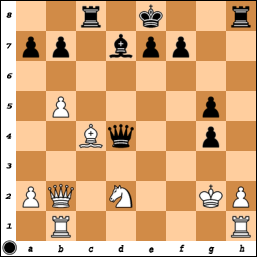
A very natural move and practically the move that turns the tide against Black. Now it was necessary to play the very bold 22...Rxc4!! which enables Black to give check on e4 with a winning position, in spite of Black being a rook down after that.
I have calculated that sacrifice but haven't found the quiet, but killing point 23.Nxc4 Qe4+ 24.Kg1 Rh3!!, which prepares g4-g3 with a decisive attack. The white pieces are simply helpless as they lack coordination and Black covers all important squares.
This is the second sore point of this otherwise very exciting game.
22...Qxb2?! 23. Rxb2 Bf5? 24. Rf1? Understandably I didn't want to shut in my bishop but now White could have seized the opportunity to close the c-file by means of 24.Bd5! b6 25.Bc6+ when it should be him who is playing for the win. 24...e6 25. Be2?! Rc3
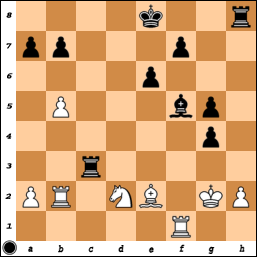
White has lost the thread completely. After the arrival of the black rook in White's camp, Black has sufficient counterplay and his position is not worse any more. White must now play very accurately in order to hold.
26. b6 axb6 27. Rxb6 Rc2?! Better is 27...g3 28.hxg3 Bh3+ 29.Kf2 Bxf1 30.Nxf1 Rc7 and Black has very good winning chances. But I was concerned too much with not losing the game... 28. Bb5+ Kf8 29. Rd6 Rxa2 30. Rf2 Kg7 31. Bd3 Bxd3 32. Rxd3 Rb2 33. Rd7 Rf8 34. Ne4 Rxf2+ 35. Kxf2 Kg6 36. Rxb7 Rd8 37. Rb5 f5 38. Nc5?

White voluntarily allows his knight to be pinned, when the unpinning manoeuvre will leave his pieces badly coordinated.
38. Rd2+ 39. Kg1 Rd5 40. Ra5 f4 41. Nb7 41.Nb3 was better because it doesn't allow the black rook access to the second rank, as happened in the game. 41...Rd1+ 42. Kf2 Rd2+ 43. Kg1 f3 44. Ra6??
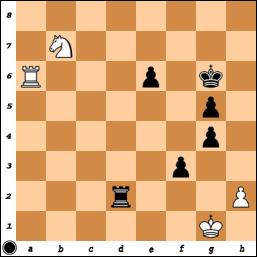
Now we're in the 15 minutes sudden death phase of the game, and it has become difficult to calculate accurately. With the blitz phase approaching, White plays a natural move that should have proved fatal. 44...Re2? I returned the favour. With 44...Rg2+ I could have won the h2-pawn under very favourable circumstances, as 45.Kh1? Rb2 wins the knight at b7 due to the backrank mate. After the knight returns back home, a win is much more difficult for Black. 45. Nc5 Kf5 46. Nd3 Rg2+ 47. Kh1??
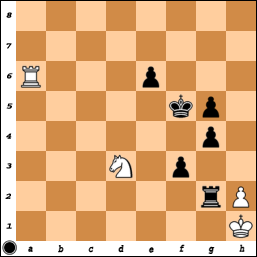
White falls for the same trick again. After 47.Kf1 Rxh2 48.Ra5+ Ke4 49.Nf2+ Kf4 50.Ra4+ Kf5 51.Nxg4 Re2 52.Nh6+ Kg6 53.Ng4 e5 54.Ra3 e4 55.Ra5 White should be able to hold the draw. 47...Rd2 48. Ra5+ Kf6 0-1
Insane...


Congratulations to a fantastic game with brilliant tactics! Don' get mad about some missed great moves. That's chess.
ReplyDeleteGrosses Kino! Die Partie und der lebendige Kommentarstil machen Appetit auf mehr!
ReplyDeleteP.S. Auch die unsterbliche Partie war nicht fehlerfrei.